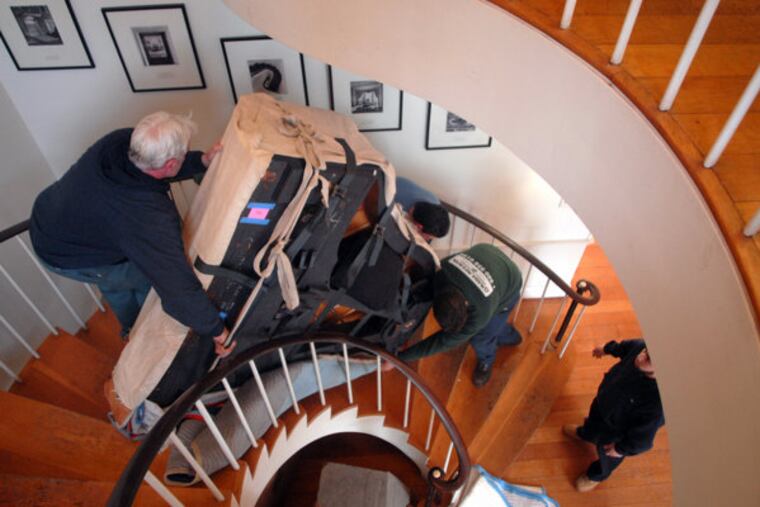Best-rated movers in the Philadelphia region, and tips for a smooth moving experience
A top company should take good care of your possessions while moving them from home A to home B, respecting your time, spaces, and stuff.

There was a time when you could move all your stuff with a buddy, a van, and a six-pack of cheap brews to bribe said friend. But those days are in your rear-view mirror. So, like most grownups, you’ll need to hire movers.
A top company should take good care of your possessions while moving them from home A to home B, respecting your time, spaces, and stuff.
Checkbook.org’s ratings of area moving companies will help you find a business that will do a good job. Through a special arrangement, The Inquirer readers can access Checkbook’s ratings for free through July 7.
Think first about what services you need. You’ll save a lot of money by doing some or a lot of the work yourself. You’ll save the most by packing your own stuff — on most local moves, paying a moving company to do all the packing doubles your costs. And for a local move, you can save by transporting your own boxes and other small items, which account for a substantial amount of the weight and expense of a move. Then let a mover handle the piano, dressers, and other heavy, hard-to-move items. But plan to move jewelry, framed art, and other especially valuable belongings yourself.
For whatever help you need, be sure to get prices from several companies. Estimates should detail the services to be performed and include an inventory of items to be moved; otherwise, on moving day you may get into a dispute with a mover who wants to charge extra for work you thought the estimate included.
Checkbook’s undercover shoppers collected prices for two local moves and three hypothetical long-distance moves, and for each job found dramatic company-to-company price differences. For example, prices quoted to move the contents of a four-bedroom house from Collegeville to Royersford ranged from $2,000 or less to $3,938. And to move 9,000 pounds of goods 750 miles from the Delaware Valley to Chicago, Checkbook’s shoppers were quoted prices ranging from $4,300 to $8,500.
For local moves, companies usually charged based on the number of workers and amount of containers. Most companies if asked will offer estimates with caps — you won’t pay more than the cap, and you’ll pay less if it takes less time than estimated.
Checkbook strongly recommends that you get an estimate with a cap. Otherwise the company may work slowly, and you’ll pay more than estimated. Also, without a binding price from each company, you lack a sound basis for comparing prices.
For long-distance moves, moving companies operate under a tariff system that calculates the cost of moves using weight and mileage, not hours. Company tariffs also stipulate special charges for packing and exceptional matters, such as storage, extra stops and waiting time.
However, a company’s specific tariff rate for a given move is somewhat irrelevant because it can still impose exceptions to its filed tariff rates. Usually, a company agrees to discount its tariff rate, or portions of its tariff rate, by a specified percentage. It might, for example, offer a 35 percent discount for the long-haul part of its charges and a 20 percent discount for packing.
As with local moves, for long-distance moves we advise you to get either binding estimates or estimates with a binding maximum.
If you need storage services, or if your goods will be placed into storage while awaiting transfer during a long-distance move, get prices for it and obtain documents indicating where the goods will be stored and check on the charges. If possible, inspect the storage facility. Also, get proof that insurance will cover your belongings against theft, fire and other risks while in storage, because insurance for goods in transit won’t cover them during long-term storage.
During your move, be on the scene — and attentive — when your belongings are loaded and unloaded. Make sure the moving company prepares an inventory of your belongings. Carefully read the “bill of lading” before you sign it. Later, as your goods are unloaded, check the condition of each item. You won’t have time to open every carton, so focus on inspecting cartons containing especially fragile or valuable items. Don’t sign the inventory or any other paper without first noting any damage that has occurred. Signing a document that does not note damage will make it hard to collect for damage later.
If you find damage after the movers leave, notify the company promptly; and keep the broken items and packing materials as you found them in the box, so the mover’s claims representative can check them.
Finally, when shopping for a mover, beware of brokers. Several brokers operate on the internet, often disguising themselves as local moving outfits. These companies do not own or operate any trucks or employ movers; they simply collect a deposit and arrange for a moving company to handle your move. The problem with such arrangements is that you have no control over who actually performs the work. Because the broker chooses the mover, you may get stuck with an inferior outfit. And because the broker typically collects its fee upfront, it may be uninterested in mediating disputes with the mover.
—Delaware Valley Consumers’ Checkbook is a nonprofit organization with a mission to help consumers get the best service and lowest prices. It is supported by consumers and takes no money from the service providers it evaluates.